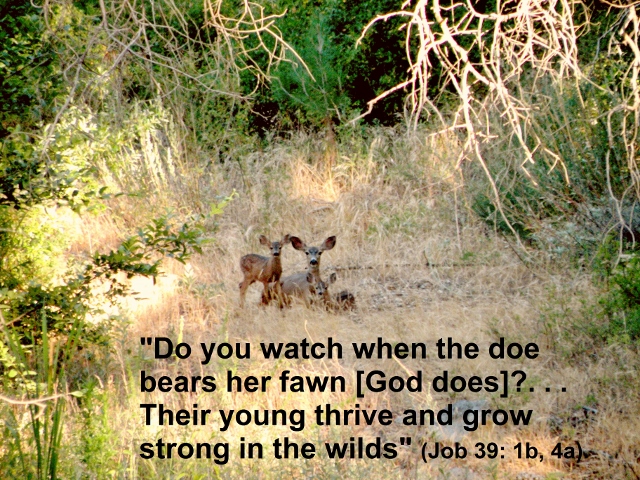
Part Three: How God Demonstrates His Love and Provision for Animals—and Observes in Nature What People Rarely See
Someone once told me that the Bible doesn’t say much about animals, so maybe we shouldn’t either. Is this true? The answer is no; God has much to say about animals!
Numerous passages in the Bible describe how God made specific provisions for the survival and propagation of animals. It begins as early as Genesis chapter one. The creation story relates that God designed Earth from the beginning to support animal life. Before the first creatures were spoken into existence, He created vegetation to produce “plants bearing seed according to their kinds and trees bearing fruit with seed in it according to their kinds” to be food for both humans and animals (Gen. 1:12, 29-30). Thus, food and shelter were available when wildlife began to inhabit the earth.
Further along in history, God’s concern for the welfare of non-human life continued with the emerging Jewish nation. He commanded the Israelites to adhere to specific stewardship guidelines that included provisions for wild animals (e.g., Ex. 23:10–11; Lev. 25:1–7). Moreover, God required humane treatment of domestic animals. This is expressed in Proverbs 12:10: “A righteous man cares for the need of his animal,” and in God’s instructions on the care of farm animals (e.g., Exod. 23:12; Deut. 22:1-4; 25:4).
God provides food, shelter, and habitats for wild animals apart from human considerations. Nowhere does the Bible communicate God’s love and joy for animals—independent of His even greater love and joy for people—more clearly than in Job 38 and 39 and Psalm 104. These passages mention specific animals and specific habitats, which God prepared for individual varieties of animals: The wild donkey was given “the wasteland as a home, the salt flats as his habitat” (Job 39:6). The Ostrich “lays her eggs on the ground and lets them warm in the sand” (13-14). The eagle builds “his nest on high” and “dwells on a cliff . . . a rocky crag is his stronghold” (27-28). God “makes springs pour water into the ravines; it flows between the mountains” to give “water to all the beasts of the field.” There “the wild donkeys quench their thirst” (Ps. 104:10-11). God waters the trees He created, and there “the birds make their nests; the stork has its home in the pine trees. The high mountains belong to the wild goats; the crags are a refuge for the coneys” (17-18). God “provides food for the raven (Job 38:41) and the lions “seek their food from God” (Ps. 104:21). Indeed, all animals, the Psalmist declares, look to God “to give them their food at the proper time” (v. 27).
In a series of rhetorical questions, He asked Job, God reveals He is always present and observers all the activates of wild animals, just as he does all people: “Do you know when the mountain goats give birth? Do you watch when the doe bears her fawn? Do you count the months till they bear? Do you know the time they give birth?” (39:1-2). The self-evident answer to these rhetorical questions is that only God observes these events and is present when they occur.
In sum, Animals have intrinsic worth and value to God because He created and values them. This is more evidence that God has an eternal plan for the creatures He loves and created.
Next week: In the next three blogs we’ll look at the bedrock evidence that pets and wild animals will join God’s people in Heaven: Do they have souls? Together, they will demonstrate biblically, with scientific support, that animals do have souls.
Note: The blog articles in this series are adapted from my book Will Dogs Chase Cats in Heaven? People, Pets, and Wild Animals in the Afterlife. To review the book, go to my home page and click on “description below the cover photo.
Love this series. I have always believed that everything our Creator made would always have a place with Him.